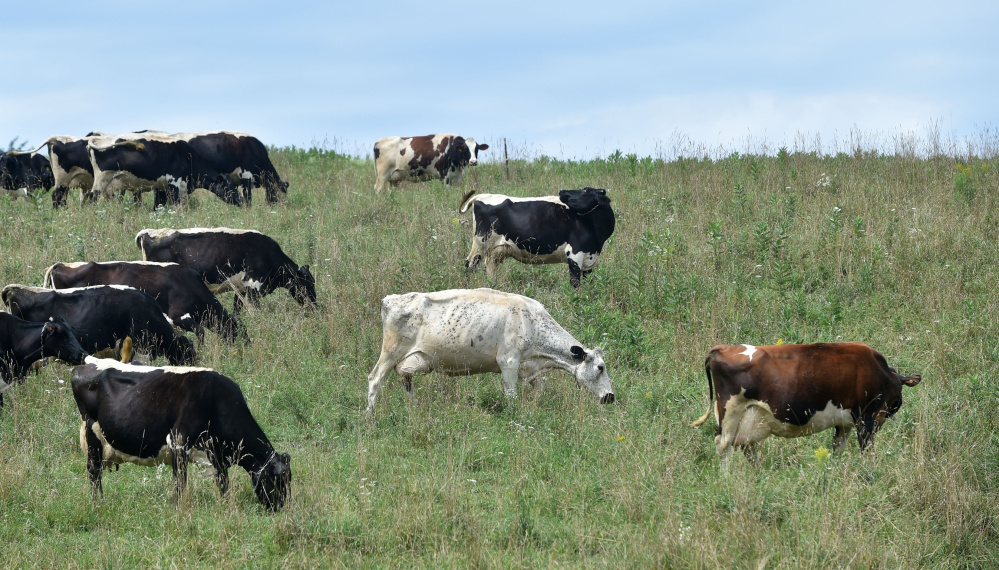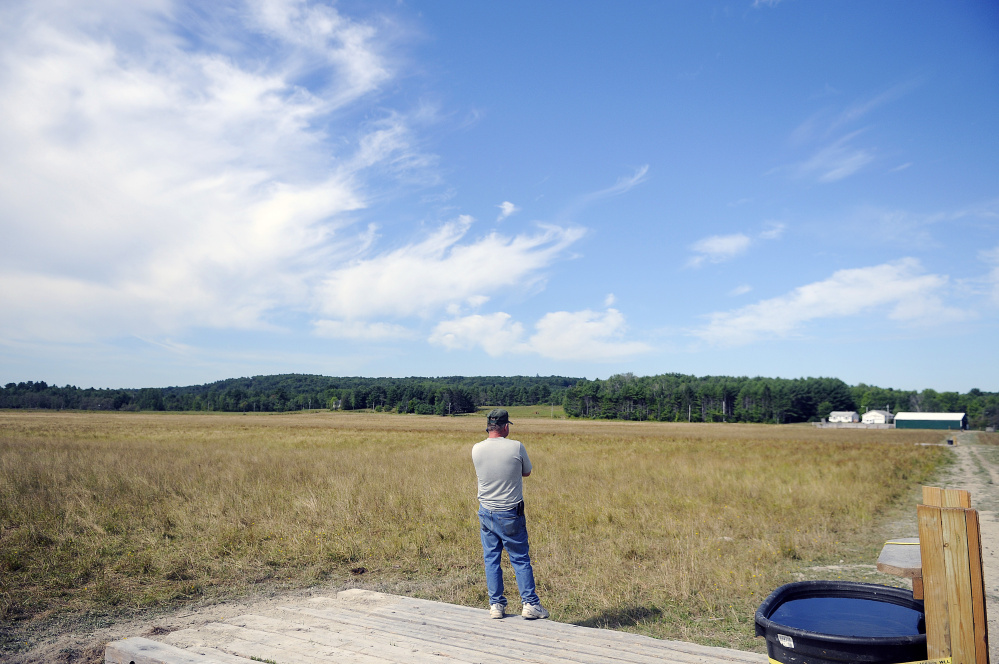AUGUSTA — The drought that hit New England last spring and summer affected many Maine farmers, particularly in the southern third of the state. Reduced hay harvests, smaller fruit yields and a greater reliance on irrigation systems were a few of the symptoms of the driest growing season the state had seen in years.
But while a panel of experts who spoke on Wednesday in Augusta agreed that last summer was a parched one, they didn’t recommend that Maine farmers bet on the next few growing seasons being exactly the same.
Rather, they argued, farmers should steel themselves for more variable weather in the decades to come, whether by diversifying their crops, improving their soil or buying insurance. They also suggested that there may be some benefits to changes in the growing season, including the opportunity to plant earlier and invest in new crops.
“We’re going to have extreme weather conditions one way or the other,” said Richard Kersbergen, a forage and dairy specialist at the University of Maine Cooperative Extension. “I’m not sure if it’s going to be more wet or dry, but I think the variation is going to be more extreme, and so (farmers should try) to build some sort of resilience.”
Kersbergen specifically advised farmers to consider diversifying their mix of crops and adding more organic matter to their soils so that they hold moisture better.
Kersbergen was one of four speakers on the panel, which was one of many talks and demonstrations being held Tuesday, Wednesday and Thursday as part of the 76th Annual Maine Agricultural Trades Show at the Augusta Civic Center. The panel also included Sean Birkel, the Maine state climatologist, and two people familiar with state and federal programs available to farmers at risk of losing their crops during weather events.
While Birkel called the recent drought “certainly the worst in at least a decade,” he said that overall, Maine actually saw “a little more rainfall than normal” in 2016. That’s because some northern parts of the state experienced either no drought or even more rain than normal, Birkel said.
What’s more, Maine has been recording greater rainfall totals in recent years. While Birkel did not provide an explanation for that trend, he said it has coincided with the melting of sea ice in the Arctic and changes in the jet stream that flows across the Northern Hemisphere.
“There’s more precipitation overall, in part due to warming ocean water sending more moisture in the air, but the delivery has been in more extreme rainfall events,” Birkel said. “That has been a big contributor to the last several years of more total annual precipitation, yet there can still be drought in some areas, so it’s a fairly complex picture.”
One way for farmers to prepare for more variable weather patterns is by obtaining crop insurance, according to Erin Roche, a program manager at the University of Maine Cooperative Extension. That insurance can provide payments to farmers who lose a significant number of crops because of weather conditions such as drought, wind or hail.
The most common cause of losses for farmers in the state’s insurance programs is excessive moisture, but last year drought was the most common reason. Nineteen payments, totaling $379,122 in value, were made to farmers who suffered drought-related losses in 2016, Roche said. The highest numbers of payments were in York and Oxford counties.
“It’s up to farmers to really plan for all types of weather and have some sort of contingency plan,” Roche said.
Ed Castonguay, a 68-year-old dairy farmer in Livermore who attended the trade show Wednesday, felt the effects of the drought last summer. His farm normally generates at least three hay crops during the growing season, which feeds 170 cows; but this year the farm produced just two crops, and the second one was smaller than normal.
Still, Castonguay said, he is not considering buying crop insurance because he does not think it will be worth the premiums.
Two younger Maine farmers, Chad and Lea Thornwall, said they are considering getting insurance for the 125-acre farm in Hampden that they bought about two years ago after moving here from Colorado with their three young children. They raise dairy goats, and last summer they ended up having to buy feed after being able to harvest only one round of hay.
They moved to Maine largely because of the relative abundance of water, Chad Thornwall said, in sharp contrast with the drought that has affected the Western U.S. for the last couple years. At one point, he said, they had to evacuate their home in Colorado because of wildfires happening nearby.
Despite the difficulties posed by the drought in Maine last summer, another speaker on the Wednesday panel said the time is right for young farmers like the Thornwalls to consider starting operations in Maine.
“It’s a great time to get into farming,” said Don Todd, Maine state executive director for the Farm Service Agency of the U.S. Department of Agriculture. “If you can make it pay for a while, it’s going to get better because our market is going to start developing more rapidly as water becomes more of an issue in the West.”
To that end, Todd recommended farmers visit the nearest office of the Farm Service Agency to see what types of disaster assistance and loans may be available to them.
“We did have a very, very long period of dryness in the (1960s), and the setup we are looking at right now, if it follows the same pattern, we’re in for a long period of drought,” Todd said. “I’m hoping this doesn’t happen. I hope we have a long winter, and a long fall and spring, so we can get our water tables back up; but if that doesn’t happen, we’re going to start out this year a with a drought situation, so you should be planning and purchasing crop insurance where possible so you can reduce your losses.”
Charles Eichacker — 621-5642
Twitter: @ceichacker
Send questions/comments to the editors.









Success. Please wait for the page to reload. If the page does not reload within 5 seconds, please refresh the page.
Enter your email and password to access comments.
Hi, to comment on stories you must . This profile is in addition to your subscription and website login.
Already have a commenting profile? .
Invalid username/password.
Please check your email to confirm and complete your registration.
Only subscribers are eligible to post comments. Please subscribe or login first for digital access. Here’s why.
Use the form below to reset your password. When you've submitted your account email, we will send an email with a reset code.